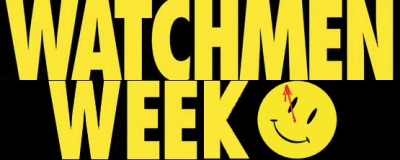|
This week, I'm going to delve into the movie Watchmen. If you haven't seen the movie or read the comic then you'll probably want to avoid my blog for a few days- especially since I'm not going to do the *Spoiler Alert* thing- save this disclaimer. We're dealing with source material that's a quarter century old. It's open game as far as I'm concerned... * * * I had a friend walk out of the movie Watchmen during the scene where The Comedian attempts to rape the Silk Spectre. Another friend of mine sent me a text message moments before I went to see the film, warning me that the movie was one long depiction of violence against women (based on that scene and a few others where women are hurt, killed, or beaten). * * * This morning, I read a stunning article by Mary Mackey about women, violence, and film. You can read it here. * * * I wonder if that's how my friend felt when she saw the violence perpetuated against women in the film Watchmen? * * * Hopefully you took the time to read Mary Mackey's article. After digesting her assessment of violence against women and the (unintentionally) meaningless violence against women in Watchmen: 3/9/2009 01:56:26 am
1. My problem with these scenes applies to my same problem with the movie in general it is way too underdeveloped in comparison to the novel. I walked out with my friend and his girlfriend and I looked at him(he also read the novel) and said I bet people who haven't read the graphic novel have no clue what was going on. At this point his girlfriend chimed in. "I didn't read it and I have no clue what was going on" 3/9/2009 03:26:20 am
I'm still trying to gather my thoughts enough to compile a review of sorts.
Emily
3/10/2009 07:44:27 am
Let's think about 300. There was only one respectable female character in this film, and there were scenes of her being overpowered and potentially seduced or raped by a male character (if my memory serves me correctly). Also about half of her time onscreen was the sex scene between her and her husband which was a bit over-erotic I think, and again if I remember correctly, I valued this scene because it was the some of the only real development of their relationship within the film, but then again I also laughed outloud at it because the nudity and eroticism was so blatant and unnecessary. Comments are closed.
|
About NathanNathan Key likes to think about faith and philosophy and talk about it with others. He lives with his family in New Hampshire. He doesn't always refer to himself in the third person. |

